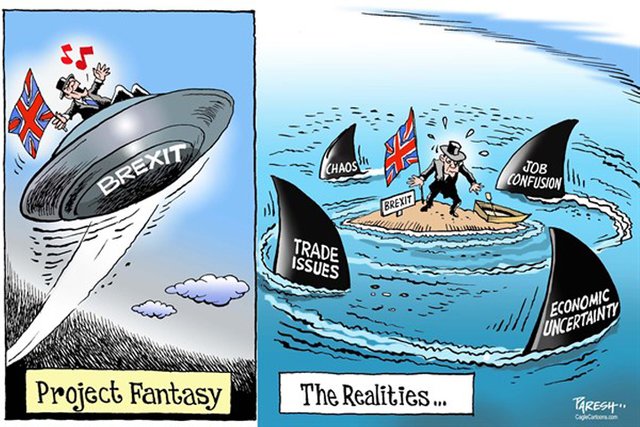Brexit Raises Interesting Questions

(Author's Note: I'm an American. I've been to the UK, once. I spent a couple days in London and an afternoon at Stonehenge. That's the extent of my firsthand experience with the UK. I'm a huge fan of British pop culture, though. Doctor Who, James Bond, Harry Potter, Monty Python, the Cornetto Trilogy, the comics of Alan Moore and Mark Millar, plus who could forget all the great rock music? I'm not a Brit, but I like the Brits, is what I'm saying.)(html comment removed: more)

In a historic move, the UK voted yesterday to exit, or "Brexit" from the European Union. I don't claim to know anything about British politics - I don't. What I do know is that the Brits are proud of their heritage. I've read a little bit about the debate, and I can honestly see pros and cons to both sides. That's not what I want to cover in this post, however. I think this vote, for all the pragmatic issues it creates, is far more interesting as a philosophical development. Regardless of how you feel about the outcome, I'd like to take this opportunity to challenge you with a few philosophical questions about the nature of government, western democracies, and political unions.
- Is secession a right? If the people in a geographic area determine that a political alliance, union, or even a government is no longer advantageous, do they have the right to sever ties? If your answer is "yes," how far does it go? Can Scotland secede from the UK? I wouldn't be surprised if they try it, as they overwhelmingly voted to remain in the EU. Can London secede from England? There's talk of that happening, too. Go farther... Does Camden, a London borough, have the right to secede from London? Does the Haverstock Ward have a right to secede from Camden? You get the idea. If your answer is "no," then are you saying that unions must be permanent? Why do you get to decide that? If secession is not allowed, and one party does it anyway, does the other party have the right to force them to remain by using violence, if necessary? Americans praise the secession from Britain, but largely demonize the secession of the South in the 1860s. Mark my words, more secession movements will arise in our lifetimes, and likely in the immediate future.
- Is "majority rule" a good system? The final result was 52% leave to 48% remain. What if the 52% who voted to leave are a bunch of blue collar morons, like the Progressive intellectual class is telling us? Should idiots make important decisions about the way their community is governed? I've already written about why I don't support democracy; you can read it here. I just find it very funny that the exact same people who are lamenting Bernie Sanders' defeat in the Democratic primaries due to an abuse of democracy are now complaining about the results of the Brexit vote because it didn't turn out the way they wanted. So, is democracy a favorable system or not? Or is it a gray area?
- How does life experience factor into our decision making? The voters electing to exit the EU were overwhelmingly older English citizens. The millenials basically voted to remain. Is this an example of the old screwing over the young? Or is this an example of people who have seen Britain both before and after the EU making a decision to leave a sinking ship? What do you think?
- Question for the US: Reading my Facebook feed, I see lots of people talking politics as this is an election year. Basically, very few people that I know are Trump or Hillary supporters because they actually like those candidates. Instead, their support for one is due to their overwhelming disdain for the other. My question is this: Instead of fighting over the next figurehead to take on one government position, albeit the most important one, perhaps it's time to question the system itself. Is having one city subjugate 300 million people really the best form of governance? There are 1.4 million federal employees. You get to vote for 4 of them. Is that your voice being heard? What if the US experiences a "Texit." (Texas wants to secede.) Should the US send in the military to force Texans to remain under Washington's rule? That's what happened last time. Should it be done again? The weapons are far superior this time, and slavery is no longer an issue.

I don't really want to just give any answers, here. I have my opinions, of course, but I don't think they're worth much since I haven't been following this vote too closely and I don't understand all of the implications. (This hasn't stopped other people from chiming in, however.) What do you think? I'd especially like to hear your opinion if you're European or you live in an EU country. Even better if you're British, and best of all if you voted. How did you vote? Why? Leave your comments below. Thanks for reading!
Here's a British liberal (not a Progressive, it means something else in the UK) and his take on the Brexit. He's obviously for it. What do you think?
Originally published June 24, 2016 on DigitalTyrants.com